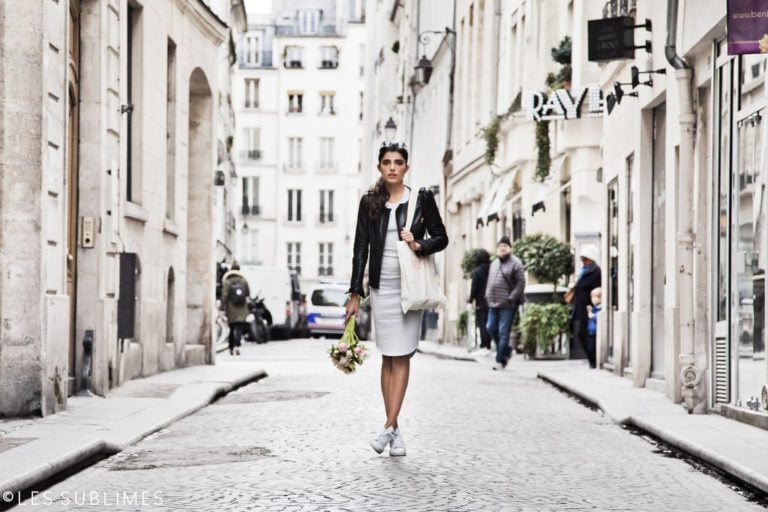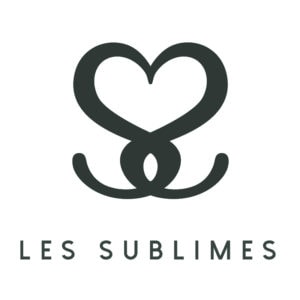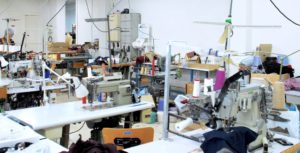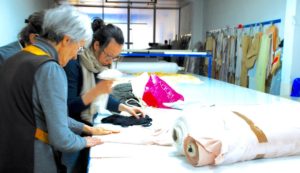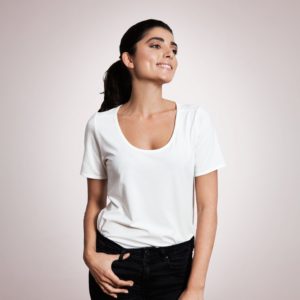We recently connected with Alexis Assoignon co-founder of for-purpose Parisian fashion brand Les Sublimes, to learn more the challenges and opportunities establishing a sustainable European fashion brand.
Les Sublimes is a young company. Officially founded in Paris in Fall 2015, the brand was launched via a crowdfunding campaign on Indiegogo in June 2016. We were driven by a desire to improve environmental and social conditions around the world, as well as to create sustainable wardrobe alternatives that we wanted but couldn’t find in the marketplace. No one was making the everyday pieces, those that make up 80% of our wardrobes, in a socially-fair and eco-friendly way. We were sick of having to pick and choose between style, affordability, comfort, quality and ethics. Les Sublimes is a brand that doesn’t make you compromise on your needs, while also making you look and feel good on the inside and out. That is what we define as being Sublimes: the combination of inner and outer beauty.
We currently use two types of fabrics in our collection: GOTS certified organic cotton and Lenzing Micro Modal, which comes from sustainably-harvested beechwood trees in Europe. It’s been extremely challenging sourcing fabrics that are high quality, comfortable, and also both eco-friendly and socially fair in terms of wages, workers rights, etc. This, is in addition to finding mills with affordable pricing for new brands and small enough minimums to meet our needs as a young company. We were shocked to discover at Premiere Vision in February, the largest fabric show in Europe, that there were almost no sustainable fabrics offered at all! They remain such a small portion of the fabric market. But that doesn’t mean that they are impossible to find. We’ve just had to get more creative. For example, as we start out, we can’t produce using a wide variety of fabrics. We have had to start with just a few, and make all of our styles out of those same materials. Our current collection is made in France, about an hour north of Lyon, in a small family-run atelier. And at our headquarters we are the two of us, the 2 founders, and we work with interns for a few months at a time, students of business and fashion here in Paris.
We offer a permanent collection, rather than products that change with each season, so we will add throughout the year new styles and fabrics, all of which remain available on an ongoing basis on our website. To develop the line, we think of the natural progression of our offering, what we would like to create that is missing from our wardrobes (especially in terms of sustainable options). Then of course we look at the seasons, launching sweaters when it’s getting cold or linen for spring. Basically, we want to encourage people to invest in quality over quantity pieces – items that provide long-term satisfaction over temporary gratification. Pieces that you love to wear all the time, and want to replace when you’ve finally worn them through, or that you want to gift to a friend, or buy in an additional color. It’s so frustrating when you find an item you love and then it’s gone forever a season later. By focusing on creating the perfect tee, or shirt or dress, we believe that we can encourage people to shop more thoughtfully.
Our customers are predominantly urban, university-educated women aged 26-34. But much more important that a statistic, she is a global citizen. The Les Sublimes woman cares about leading a healthy and conscious lifestyle, loves to travel, and isn’t afraid to chase after her dreams. She knows that she is part of something bigger than herself and wants to contribute. She’s beautiful on the inside and out.
We mainly interact with our customers online, through our website, blog, Facebook and Instagram. While we do not have a physical store, but we may consider opening experiential concept locations in the future. Less a store, more a gathering place for like-minded women, that combine shopping, a place to unwind, grab a relaxing drink and connect with others.
Initially we created Les Sublimes out of a personal need for sustainable wardrobe essentials – so we didn’t have to look far for our audience. We already knew them. It started with friends, colleagues and our personal networks. Of course we also did all of the necessary market research, but this just reinforced what we already believed was true for our customer, and proved that there was a large enough market out there for our products.
Although our customer does care about sustainability, she’s not an extremist. We understood very early on that she wants ethical products, but that she doesn’t buy them if she has to sacrifice style, quality, comfort or affordability. Most consumers still view ethics as a bonus. So we knew that to get her to choose the sustainable option, our products would have to meet all of her other needs, not just one or two. That’s how we developed a new concept of no compromise consumption. People are sick of having to choose between price, quality, integrity and style. There’s no reason why they can’t have them all!
We were really surprised to discover that France is definitely behind other markets, such as Canada, the US, Germany and Scandinavia, when it comes to shopping consciously. The French care a lot about the quality of their foods, and eating organic has become really big here. But as far as that expands into fashion and other health trends, they are still learning. On the flip side however, French women naturally shop with a philosophy of quality over quantity. So in terms of consuming less, they trump North Americans any day. They prefer to invest in high quality pieces from brands they trust, and take care of those items so that they will last for years to come. Of course she treats herself to cheaper fashion items from time to time, but the bulk of her wardrobe is very thoughtfully-curated.
We never wanted to be a one-for-one brand. Our thinking was always that responsibly made products could themselves be the long-term solution. We felt that a giving component wasn’t necessary, and can often be seen as a sales tactic. The act itself of buying better is what will make a difference. But we also realized that the women we want to support with fair wages won’t even get as far as a job without completing basic education beforehand. So we knew that our mission to empower women had to be expanded. We discovered facts, such as how girls in many less developed countries drop out of school for a lack of sanitary supplies. This is just bananas! It’s something that every woman can relate to, but for us in the West, having our periods doesn’t stop us from doing anything. Yet in poor communities, it’s a leading cause of an ongoing poverty cycle. Once we learned about this, we knew Les Sublimes was going to have to do something to address this problem.

Luckily there are not too many players in the sustainable fashion market yet. And by that we mean other brands that are truly transparent and trustworthy – both in terms of the environment and wages. Most competitors prefer to tackle one issue at a time and tend to go for either the avant-garde, tribal or artisan-made aesthetic. But these aren’t the everyday pieces most women are looking to buy or wear regularly. That’s where we come in.
Other ethical brands that we love include Reformation, Ayayu, Freedom of Animals and Patagonia. Yvon Chouiniard, the founder of Patagonia, is somewhat of an idle around here!
For more information about Les Sublimes visit: https://www.les-sublimes.com/
Alexis Assoignon co-founder

